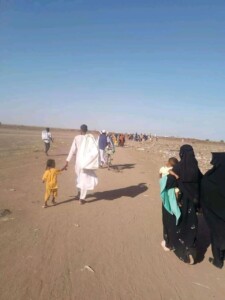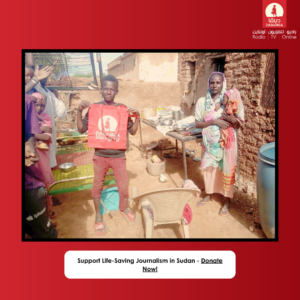Journalists tell of beatings in Sudan police detention
Authorities in Sudan released journalist Fayez El Seleik, who was detained after openly criticising the military coup d’état of October 25, in Khartoum on Thursday. He is the fifth journalist detained during the aftermath of the coup to be released.
 Feisal Mohamed Salih, who was media advisor to the Prime Minister when he was held, has been released (Photo supplied)
Feisal Mohamed Salih, who was media advisor to the Prime Minister when he was held, has been released (Photo supplied)
Authorities in Sudan released journalist Fayez El Seleik, who was detained after openly criticising the military coup d’état of October 25, in Khartoum on Thursday. He is the fifth journalist detained during the aftermath of the coup to be released.
Journalist Ali Farsab was released on November 20, Feisal Mohamed Salih, who was media advisor to the Prime Minister when he was held, was released last Monday, Yasir Awad, the director of the Khartoum satellite channel, and journalist and Sudan TV staff member Maher Abuljoukh were discharged on Saturday.
In an interview with Radio Dabanga yesterday, El Seleik described the process of his detention as a kidnapping.
He says that the operation took place as soon as he left the offices of El Jazeera, following an interview on October 26. The party that detained him did not reveal their identity to verify it except that they said they belonged to the Military Intelligence. The confiscated his phone, blindfolded him, and took him to an unknown location, which later proved to be one of the detention centres of the security apparatus in Khartoum.
The security officers told him at the detention centre that he was a guest at the security apparatus.
El Seleik spent 32 days in detention, two weeks of which were in solitary confinement, during which he remained cut off from the outside world. He was not questioned, nor was any investigation completed with him until he and the other detainees decided to engage in a hunger strike on Thursday. They were subsequently released on Thursday, Friday, and Saturday.
El Seleik was not subjected to any beating, assault, provocation or abuse, during his detention. He described El Burhan’s coup and its measures as “political piracy, a hijacking of the transitional period in Sudan and a transformation of political openness into a comprehensive path”.

after 32 days in detention (Photo: Supplied)
'No medical treatment'
Journalist Ali Farsab is still receiving treatment after a gunshot grazed his head, and he suffered a broken hand, with other injuries to different parts of his body, as a result of severe beatings by police personnel after his detention during the November 17 Marches of the Millions in Khartoum North.
Farsab told Radio Dabanga on Wednesday that he was wounded by bullet fragments while covering the demonstration before he was detained by the police.
Farsab explained that the demonstrators were subject to intense fire with live ammunition at about 15:00. When they tried to take cover, a demonstrator was hit by a gunshot in the head, and died instantly.
Three policemen then attacked Farsab, as he was trying to help another person who was hit. One of the policemen was carrying a Kalashnikov, which he pointed at Farsab before ordering the others to detain him.
The journalist was then was severely beaten with rifle butts and batons, and kicked with police boots all over his body, while he was still bleeding as a result of his head wound. The policemen also abused him verbally.

grazed his head, and he suffered a broken hand (Photo: Supplied)
He was searched and when they understood from his ID card he is a journalist, they beat him harder, he says. He was taken to another street after the policemen noticed the presence of people filming the scene. They then took him to a pick-up truck, where he was tied hand and foot, and transferred to a pick-up truck containing a group of detained people.
The beating continued until 20:30 when they were taken to the Police Centre in El Mogran. They asked Farsab about his work and the press agency for which he worked, before they took him and the other detainees to the cells of the Mogran Police Department.
In the cells, there were four people who had various injuries as a result of the beatings. Farsab explained that the policemen’s behaviour while they were inside the cells was harsh, while the only meals they received came from the detainees’ families.
They did not receive treatment despite his repeated requests to the police officers in the department to allow him to go to the hospital.
The journalist blames “the senior police commanders, not the field commanders and ordinary policemen who just carried out orders”. All forms of physical abuse and beatings took place in front of the eyes of high-ranking officers, he said.
The policemen told the detained demonstrators that their “capital is a bullet” and “you’ll die as animals” as policemen enjoy impunity and will not legally prosecuted for their actions.
They said that they, as police, use rubber bullets, but that the paramilitary Central Reserve Police (Abu Teira) use live ammunition that kills people, and Farsab confirmed the existence of negative mobilisation among the police against the demonstrators through their speech.











 and then
and then